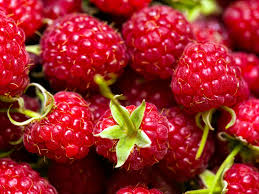
Raspberry fruit
Find out about the health benefits of raspberries. Learn why raspberries are good for you and how they can improve your overall health. Raspberries are the edible fruits of many plant species in the genus Rubus of raspberries belonging to the Rosaceae family and the most common cultivated variety is Rubus idaeus L. species. These fruits are of different colors. The most common raspberry is the red one. Fruits that have blue, black, and purple colors are also visible. Raspberry fruit is sweet, but the taste of raspberry fruit varies from place to place.
Raspberry leaf tea
Are raspberries good for you?
Raspberries are good for you
Raspberry nutrition
- Water: 85.8 g
- Calories: 52 kcal
- Total Carbohydrates: 11.9 g
- Dietary Fiber: 6.5 g
- Sugars: 4.42 g
- Protein: 1.2 g
- Total Fat: 0.65 g
- Sodium: 1 mg
- Potassium: 151 mg
- Phosphorus: 29 mg
- Magnesium: 22 mg
- Calcium: 25 mg
- Manganese: 1.2 mg
- Iron: 3.91 mg
- Zinc: 0.42 mg
- Choline: 12.3 mg
- Pantothenic acid: 0.329 mg
- Vitamin C: 26.2 mg
- Vitamin B-6: 0.055 mg
- Vitamin E: 0.87 mg
Raspberry leaf tea in pregnancy
Research shows that women who eat raspberry leaves may be less likely to have their membranes ruptured artificially, or need a cesarean section, forceps or vacuum delivery, than women in the control group.↗️
Raspberry leaf tea benefits women
Raspberry leaf tea benefits
Reduces inflammation
Raspberry leaves are rich in antioxidants, raspberry leaves are effective in cleansing the body, getting rid of free radicals, and eliminating oxidative stress. Red raspberry leaves contain polyphenols such as tannins and flavonoids. These are natural molecules, plus they act as antioxidants in your body to protect cells from damage and have anti-inflammatory properties. Raspberry leaf tea fights oxidative damage to our cells that causes chronic inflammation and other serious health conditions like heart disease, and an autoimmune disease.
A study published in the Journal of Medicinal Food in 2008, which found that raspberry leaf extract was able to inhibit the production of inflammatory compounds in the body. The study found that the extract was able to reduce the production of pro-inflammatory compounds such as nitric oxide.
One study published in the “Journal of Agricultural and Food Chemistry” in 2007 found that raspberry extract was able to inhibit the activity of COX-2 enzymes and reduce the production of pro-inflammatory compounds in human colon cancer cells.↗️
A study published in the “British Journal of Nutrition” in 2013, found that raspberry extract was able to inhibit activity of the inflammation signaling molecule Nuclear Factor Kappa B (NF-kB) in human colon cancer cells.↗️
It is important to note that most of these studies were conducted in laboratory settings and on animals, further human-based studies are needed to confirm these results and understand the exact mechanism of action.
Raspberry leaf tea is an antioxidant
Ellagic acid, an antioxidant that exhibits anti-inflammatory and anticancer properties, is one of the primary compounds present in raspberry leaf tea. Additionally, the tea contains flavonoids, and tannins, which are also powerful antioxidants that can help to protect cells from damage caused by free radicals.
Researchers determined that red raspberry leaf, a byproduct of this widespread plant, is valuable mostly for its antioxidant-rich fruit. The polyphenolic profile and antioxidative properties of red raspberry leaf extract are associated with potential biological activity. Cytotoxic effects, antioxidative/prooxidative effects, and effects on total glutathione concentrations have extensive effects on human laryngeal carcinoma and colon adenocarcinoma cell lines.↗️
Improves digestion
Raspberry leaf tea is believed to have digestive benefits due to its astringent properties. Astringents are substances that cause tissues to contract and can help to relieve diarrhea and other digestive complaints. Additionally, the tannins present in raspberry leaf tea may also help to soothe stomach cramps and reduce inflammation in the gut.
One study published in the Journal of Ethnopharmacology in 2009, found that raspberry leaf tea helped to reduce symptoms of diarrhea in rats. This study suggests that the tannins present in raspberry leaf tea may have astringent properties that help to soothe the gut and reduce inflammation.
Another study published in 2014 in the Journal of Herbs, Spices and Medicinal Plants found that raspberry leaf extract was effective in reducing colonic inflammation in mice. This study suggests that raspberry leaf tea may have anti-inflammatory properties that may help support gut health and alleviate digestive complaints.
Boosting the immune system
The high antioxidant content of raspberry leaf tea is believed to give it immune-boosting properties. Antioxidants are substances that protect cells from damage caused by free radicals, which are unstable molecules that can harm cells and contribute to the development of chronic diseases. By neutralizing free radicals, antioxidants help support the immune system and protect against infection. Additionally, raspberry leaf tea is also rich in vitamins and minerals such as vitamin C, vitamin E, and vitamin K that are known to boost the immune system.
Raspberry leaf tea benefits for skin
It is believed that raspberry leaf tea possesses antioxidant properties that can protect the skin from damage caused by free radicals. It may also contain compounds that can help to improve the tone and elasticity of the skin and may help reduce the appearance of lines and wrinkles. Raspberry leaf tea also contains compounds such as tannins and flavonoids, which may help to improve the tone and elasticity of the skin.
Tannins are a type of polyphenol that may help to tighten and firm the skin, while flavonoids a type of antioxidant that may help to reduce the appearance of fine lines and wrinkles.
People have used raspberry leaves since ancient times to treat various skin conditions, including rashes, eczema, cuts, and psoriasis. Raspberry leave is believed to have astringent properties. They can help to tighten the skin and reduce oiliness, making them particularly useful for individuals with acne or oily skin.
Additionally, the anti-inflammatory properties of raspberry leaves may help to soothe irritated skin and improve skin firmness.
How to make raspberry leaf tea

Instructions for making raspberry leaf tea:
- Pick good leaves and wash them. Then in a saucepan, heat a cup of water until it reaches boiling point.
- Add a handful of raspberry leaves to the water and let it boil for a minute or so. Turn off the flame and leave for some time.
- Finally add as much sugar as you need, and stir the raspberry leaf tea into the mug and stir. Enjoy!
Raspberry benefits
Raspberries are a nutritious fruit that offers several health benefits. Some of the key benefits of raspberries include:
Rich in antioxidants
Raspberry is high in antioxidants, particularly vitamin C, which helps to protect the body against damage from harmful molecules known as free radicals. Raspberries are unstable molecules that can damage cells and contribute to the development of chronic diseases such as cancer and heart disease. Raspberries are low in calories, with one cup of raspberries providing only 64 calories. This makes them a good food choice for those who are trying to maintain a healthy weight or who are watching their calorie intake.
Free radicals can cause oxidative stress, causing cell damage. Both endogenous and exogenous sources generate free radicals. Immune cell activation, inflammation, ischemia, infection, cancer, excessive exercise, mental stress, and aging are all responsible for endogenous free radical production.↗️ A 2017 study in Oxidative Medicine and Cellular Longevity found that antioxidant molecules prevent oxidative stress caused by free radicals.
Studies have demonstrated that the antioxidants present in raspberries exhibit high antioxidant activity in vitro, indicating their effectiveness in neutralizing free radicals and preventing cellular damage. Some studies have also suggested that the antioxidants in raspberries may help to protect against oxidative stress-related diseases, such as cancer and heart disease. Raspberries are also a good source of other nutrients, including fiber, vitamin C, and manganese, which can also support overall health and reduce the risk of certain health conditions.
A 2015 study in Molecules, mentioned highlights the potential health benefits of consuming antioxidant-rich fruits like raspberries. Antioxidants help to neutralize harmful free radicals that can contribute to the development of chronic diseases, and a diet rich in antioxidants has been linked to a lower risk of cardiovascular diseases, cancer, and other stress-related diseases.
May help to lower inflammation
Inflammation is a natural response of the body to injury or infection, but chronic inflammation can contribute to the development of many chronic diseases, including cancer, heart disease, and type-2 diabetes. By reducing inflammation, raspberries may help to protect against these diseases. Some studies suggest that the antioxidants found in raspberries may help reduce inflammation in the body, which is thought to play a role in many chronic diseases.
Studies have demonstrated that ellagitannins, found in raspberries, can inhibit the activity of certain enzymes and molecules involved in the inflammatory process. Ellagitannins have been shown to inhibit the activity of the enzyme cyclooxygenase-2 (COX-2), which produces pro-inflammatory compounds called prostaglandins.↗️
Raspberries Good for Heart Health
Some research has suggested that the antioxidants found in raspberries may improve heart health. Antioxidants can help to reduce oxidative stress and inflammation, both of which are factors that contribute to the development of heart disease. Additionally, the fiber in raspberries can help to regulate cholesterol levels, which is also important for heart health.
Research has shown that red raspberries have a unique polyphenol profile characterized primarily by their anthocyanins. Anthocyanins play an important role as natural organic compounds, not only as edible pigments but also in preventing diseases such as tumors, aging, and cardiovascular issues in humans, as well as combating the effects of oxidative stress.
Raspberries are a good source of potassium, omega-3 fatty acids, and manganese, all of which have various health benefits, including supporting heart function, lowering blood pressure, preventing stroke and heart disease, promoting healthy bones and skin, and regulating blood sugar. Raspberries contain antioxidants, such as anthocyanins and ellagic acid, vitamin C, which help to protect the heart and blood vessels from damage caused by oxidative stress and inflammation. They also contain fiber, which can help lower cholesterol levels and improve heart health.
A review of several studies published in “Molecules” found that antioxidants and other phytochemicals in raspberries may help protect against heart disease by reducing oxidative stress, improving cholesterol levels and reducing inflammation in the body.
Anticancer properties
Raspberries contain various compounds, such as vitamins, minerals, and antioxidants, that have potential anti-cancer effects and could enhance the benefits of breast cancer treatment. Understanding the mechanisms and effects of the compounds present in raspberries, such as vitamins, minerals, and antioxidants, in cancer prevention and treatment requires further research
Raspberries contain several compounds with potential anti-cancer activities, including antioxidants, vitamins, and minerals. Compounds such as vitamin C, vitamin E, and beta-carotene have been demonstrated to possess antioxidant properties that can aid in protecting cells against damage caused by free radicals. Free radicals can contribute to the development of cancer by causing mutations in DNA and other cellular structures.
Some studies have suggested that the antioxidants in raspberries may have anticancer properties. A study published in the Journal of Nutritional Biochemistry found that raspberries inhibited the growth of breast cancer cells in vitro, and another study published in the Journal of Agricultural and Food Chemistry found that raspberry extracts had anti-tumor effects in animal models of colon cancer.
A study published in the journal Nutrition Research in 2010 found that an extract of Meeker red raspberries was effective in killing a significant number of stomach, colon, and breast cancer cells. The researchers estimated that the antioxidants in the raspberry extract were responsible for approximately half of the destruction of breast cancer cells, with a greater effect observed on breast cancer cells compared to the other types of cancer cells studied.
Cognitive function
Some studies have suggested that the antioxidants in raspberries may improve cognitive function. Research has demonstrated that the polyphenols found in raspberries can improve memory and learning. A study published in the British Journal of Nutrition found that raspberry supplementation improved cognitive function in elderly rats, and another study published in the Journal of Agricultural and Food Chemistry found that raspberry extracts improved memory and learning in mice.
Raspberries help prevent oxidative stress, an imbalance between cell-damaging free radicals and the body’s ability to combat their damaging effects. Since oxidative stress is a risk factor for diseases like Alzheimer’s and Parkinson’s, raspberries are a top brain-supporting food.↗️
According to a 2022 study in Scientific Reports, flavonoids in berries help to have beneficial effects on brain relaxation, cognitive function, memory, executive function, processing speed and attention indices.
This information is taken from cavernomasociety.org.uk, Raspberries are rich in anthocyanins, anthocyanins are powerful antioxidants that can control the free radical-mediated generation of amyloid peptides (beta-amyloid) in the brain, which cause Alzheimer’s disease. This is especially relevant for people with cavernomas, who may be at high risk for Alzheimer’s disease.
Boost Eye Health

Antioxidants in raspberries, such as vitamin C and anthocyanins, protect the eyes from oxidative stress caused by free radicals. This type of stress can damage cells in the eyes and increase the risk of age-related eye diseases such as cataracts and macular degeneration. Vitamin C, in particular, helps to maintain the health of the blood vessels in the eyes and prevent damage to the retina.
In addition, raspberries are also a good source of lutein and zeaxanthin, two carotenoids that are important for eye health. The macula, a part of the retina responsible for central vision, concentrates these nutrients. By consuming adequate amounts of lutein and zeaxanthin, people may reduce the risk of developing age-related macular degeneration.
Studies indicate that researchers claim Red Raspberry, which contains lutein, a carotenoid found in many fruits and vegetables, can significantly reduce the risk of developing macular degeneration of the eyes and promote good eye health. Even normal-sighted individuals who take this supplement have reported reduced glare and sharper vision. Exposure to brilliant sunlight or computer screens on a daily basis may also benefit from taking it
Improve Hair & Skin Health
Raspberries are a nutritious fruit that contains several key nutrients beneficial for skin and hair health. Here’s a more detailed look at the specific ways that these nutrients can help:
Vitamin C: This nutrient is essential for the production of collagen, a protein that gives skin its elasticity and firmness. Vitamin C also helps protect the skin from damage caused by environmental factors like sun exposure and pollution.
Vitamin E: This antioxidant helps protect the skin from free radical damage and has been shown to improve skin hydration and barrier function. It also promotes healthy hair growth by improving blood circulation to the scalp.
Folate: This B vitamin is important for cell growth and repair, including skin and hair cells. Adequate folate intake is necessary for healthy hair growth and may also help prevent hair loss.
Antioxidants: Raspberries contain antioxidants like anthocyanins, which protect the skin and hair from oxidative stress and damage caused by free radicals. Antioxidants also help protect against sun damage and can reduce inflammation, leading to healthier skin.
Incorporating raspberries into a well-balanced diet is one way to support skin and hair health. However, it’s important to remember that a variety of foods. Along with proper hydration and self-care practices, they can also play a role in promoting healthy skin and hair.
Helps control diabetes
Raspberries are a type of berry that is low in calories, carbohydrates, and sugar, and high in fiber. This makes them a good choice for individuals with diabetes, who often need to manage their blood sugar levels.
The low glycemic index of raspberries, which is 40, indicates that the body absorbs them slowly. This results in a gradual and steady increase in blood sugar levels, making raspberries a good choice for individuals looking to regulate their blood sugar levels.
In addition to their low glycemic index, raspberries are a good source of fiber, vitamins, and minerals, and contain antioxidants that can help improve overall health. Fiber slows digestion and helps regulate the absorption of carbohydrates, which can help control blood sugar levels. The antioxidants in raspberries, such as anthocyanins, may also have anti-inflammatory properties that can help protect against the development and progression of diabetes-related complications, such as cardiovascular disease.
A study published today by the Illinois Institute of Technology shows the benefits of including red raspberries in the diet of people with pre-diabetes and insulin resistance. According to the Centers for Disease Control and Prevention (CDC), an estimated 34 percent of American adults, around 84.1 million in all, had prediabetes in 2015. Patients with prediabetes are at higher risk for a number of conditions—including developing type 2 diabetes, cardiovascular disease, and Alzheimer’s disease.
Red raspberry (RR) contains various phytonutrients with the potential to modulate insulin function, glucose and lipid metabolism. Red raspberries may have clinically beneficial effects in the prevention and management of chronic diseases by improving glucose management and insulin sensitivity, adiposity, lipid profile, ectopic lipid deposition, inflammation, oxidative stress, and cardiac health.↗️
Raspberry side effects
Eating large amounts of raspberries or taking raspberry supplements can lead to some side effects, including:
- Stomach upset: Consuming too many raspberries can lead to abdominal pain, bloating, and diarrhea.
- Diarrhea: Raspberries contain a type of soluble fiber known as pectin, which can cause digestive issues such as diarrhea if consumed in excessive amounts.
- Nausea: Consuming a large amount of raspberries can cause feelings of nausea and vomiting.
- Vomiting: In some cases, excessive consumption of raspberries can lead to vomiting.
- Allergic reactions: Some individuals may be allergic to raspberries or related plants, and consuming raspberries can lead to symptoms such as itching, hives, or anaphylaxis.
Raspberry leaf tea a common remedy for menstrual pain relief, may cause side effects such as:
- Nausea: Some individuals may experience feelings of nausea after consuming raspberry leaf tea.
- Headache: Raspberry leaf tea can cause headaches in some individuals.
- Vomiting: Consuming raspberry leaf tea may cause vomiting in some cases.
- Contractions of the uterus: Raspberry leaf tea has been shown to cause contractions of the uterus, which may lead to a miscarriage. Pregnant women should avoid raspberry leaf tea.




Thank you for writing this post!
Thank you.
Thank you for providing me with these article examples. May I ask you a question?
I’d like to find out more? I’d love to find out more details.
Thank you for writing this post!
Thank you for providing me with these article examples. May I ask you a question?